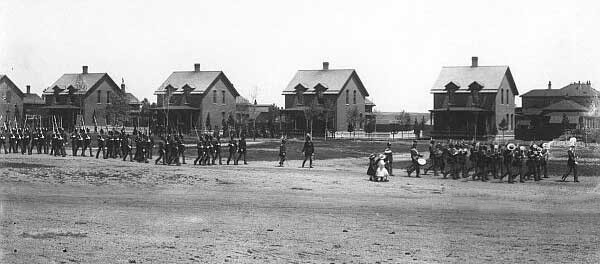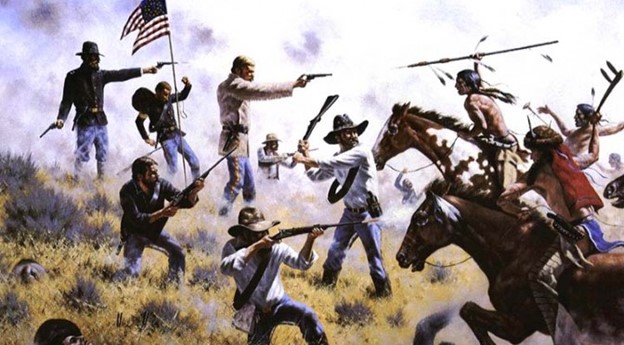Military Myths and Legends: The Ghosts of F.E. Warren AFB

Before F.E. Warren Air Force Base had the power to destroy most of civilization, it was a tiny Army outpost on the American frontier, built to protect Union Pacific Railroad workers. Being the oldest continuously active Air Force installation comes with a lot of history, but like most of the military, its history can get pretty bloody.
 After 186 years of accidents, death, and destruction, you're bound to have a couple of ghosts hanging around, even in Wyoming – and F.E. Warren has all the ghosts you might expect.
After 186 years of accidents, death, and destruction, you're bound to have a couple of ghosts hanging around, even in Wyoming – and F.E. Warren has all the ghosts you might expect.
Today, Warren is part of the Air Force Global Strike Command and has an estimated 150 nuclear missiles ready to go whenever North Korea gets too big for its britches. Needless to say, times were very different when it was first built by the Army in 1867. It was initially named Fort D. A. Russell and was built for the 30th Infantry and Company H of the U.S. 2nd Cavalry.
Their mission was protecting workers and building the Transcontinental Railroad, and nearby Cheyenne, Wyoming, was America's railroad capital. One of the chief problems facing the construction of the railroad was that it passed through the traditional lands of the Sioux, Arapaho, Cheyenne, Crow, Blackfoot, Bannock, Snake, and Shoshone tribes, who would all aggressively defend their lands.
During the Civil War, the U.S. government was forced to focus its attention on beating the Confederates, and the Natives took full advantage of that shift in the West. 1865 was known as the "Bloody Year on the Plains." After taking a beating on the plains for five years while it fought the Civil War, the U.S. Army finally returned to protect the settlers and railway workers in a very proactive and violent way.
 Scouts and cavalry from Fort Russell struck out from Cheyenne to hunt down marauding tribesmen who were using southern Montana as a base to conduct raids, steal livestock, and kill settlers. The American cavalry's chief tactic was to fight the Natives wherever they met them, turning the area into a 90,000–square–mile battlefield.
Scouts and cavalry from Fort Russell struck out from Cheyenne to hunt down marauding tribesmen who were using southern Montana as a base to conduct raids, steal livestock, and kill settlers. The American cavalry's chief tactic was to fight the Natives wherever they met them, turning the area into a 90,000–square–mile battlefield.
Between 1867 and 1895, the U.S. Army fought the tribes in a series of violent and bloody conflicts, including Red Cloud's War and the Great Sioux War, along with massacres at Sand Creek, Washita, Marias, and elsewhere. The Native tribes were, of course, eventually subjugated, but they did not go without a fight.
An estimated 8,500 tribesmen are believed to have died in battles during the Indian Wars of the latter half of the 19th Century. That number does not include women, children, and the elderly killed in Army raids and massacres in villages.
The U.S. Army lost around 1% of its total manpower in combat with Natives, numbering in the hundreds of troops killed in action. This number doesn't include the settlers killed in raids by Native bands. Total casualty figures are much higher on both sides.
 For the last 100-plus years, even after Fort Russell became F.E Warren Air Force Base, military personnel and civilians alike have reported seeing uniformed cavalry troops patrolling areas in and around the base. Warren is known as one of the most haunted places in Wyoming and the United States in general, and it's not only because of the spectral troopers.
For the last 100-plus years, even after Fort Russell became F.E Warren Air Force Base, military personnel and civilians alike have reported seeing uniformed cavalry troops patrolling areas in and around the base. Warren is known as one of the most haunted places in Wyoming and the United States in general, and it's not only because of the spectral troopers.
The current Security Forces building was once the base hospital, and in its basement was the morgue. SF airmen claim to see women walking around its corridors as if they were checking in on patients. Another haunted site was the scene of a grisly crime when an escaped mental patient killed six nurses where they slept. That building now houses the Wyoming Civil Air Patrol.
The most famous ghostly resident of F.E. Warren has to be a ghost called "Gus." The story goes that Gus was sleeping with an officer's wife when the officer surprised the lovers in bed. Gus decided to jump out a window but accidentally hanged himself on a clothesline. Now known as "Gus Quarters," Gus is said to be opening and closing cupboards and drawers, forever looking for his pants.